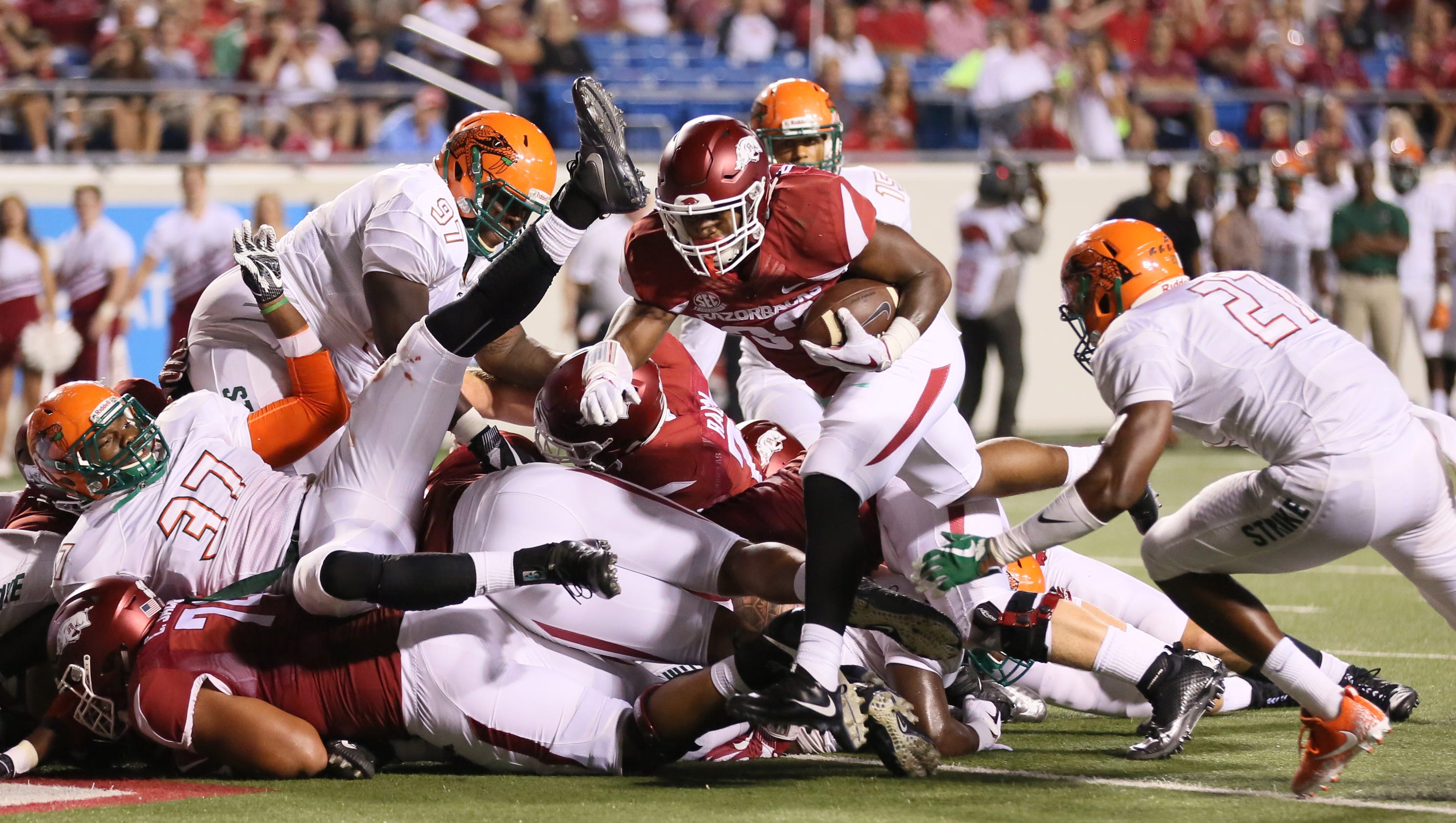Take a look at USA TODAY Sports' projected top 10 teams ahead of the 2018 college football season. USA TODAY Sports
LITTLE ROCK – Long after the other coaches and all of the players had retreated to the warmth of the locker room – and the majority of the crowd had headed for the exits, too – Chad Morris was still out there.
“It’s a beautiful day,” Arkansas’ new coach would say a little later. “An absolutely gorgeous day to play football.”
It wasn’t. As the temperature hovered in the mid-30s, overcast skies and a constant wind made it feel more like the mid-20s, and it sleeted for part of the morning. Which is why only 7,000 people showed up for the Razorbacks’ spring game last Saturday at War Memorial Stadium. And why it was especially striking when Morris stuck around, signing autographs, posing for photos and chatting with fans.
“Just my way of saying ‘thank you,’” Morris says.
SPRING PREVIEWS:ACC | Big Ten | Big 12 | Pac-12 | SEC I American | C-USA | Independents | Mountain West
YOUNG GUN: Talk of USC's spring practice is quarterback still in high school
PETTINESS: Why Mississippi won't support Shea Patterson's decision to transfer
In one sense, the scene was simply a continuation of the charm offensive Morris has undertaken since he was named Arkansas coach last December, and which will continue in a series of offseason appearances throughout the state. He calls it building relationships one handshake at a time. But there’s more going on here, and it likely extends to more than just faux football played on an unseasonably cold April afternoon.
Let’s be clear, the Razorbacks played their spring game in Little Rock for the first time since 1988 almost solely because of ongoing construction at Reynolds Razorback Stadium on campus.
“I think they wanted to reach out and reconnect with the rest of the state,” says Kane Webb, director of the Arkansas Department of Parks and Tourism, which oversees War Memorial Stadium. “It was kind of a symbolic gesture by the new regime.”
But a more tangible indication might be coming soon.
After 70 years as a part-time home for Arkansas football games, there’s only one more game scheduled at War Memorial Stadium. The current contract expires after the 2018 season, and as recently as last fall, when Arkansas officials presented a 39-page Powerpoint document comparing and contrasting the stadiums, a feeling of inevitability had settled in. Many expected the Ole Miss game Oct. 13 to be the Hogs’ last in the state capital.
But momentum may have changed. There’s no handshake just yet, but it appears actual games are likely to remain in Little Rock, too.
“By nature I’m always optimistic about these games,” says Kevin Crass, a Little Rock attorney and chairman of the War Memorial Stadium Commission. “But I’m more optimistic than I was.”
--
Arkansas is the only Football Bowl Subdivision football program that regularly plays home games in a city almost 200 miles from its campus. It’s been that way for more than 100 years, with games split between Fayetteville and Little Rock. Beginning in 1948, when War Memorial Stadium was built – in large part at the urging of university officials – the venue helped to build Arkansas football into a statewide passion, its central location providing much easier access to the Razorbacks than the campus tucked into the state’s mountainous northwest corner.
For a long time it might’ve been less a second home than the Hogs’ primary venue; they regularly played as many as four games there each season. But for the last few years, it appeared the unique arrangement was finally winding down – that like other southern schools like Alabama (Birmingham) and Mississippi (Jackson) had long before, the Razorbacks would stop playing home games away from home.
Freeways had long since eased the journey to Fayetteville. Northwest Arkansas has grown in recent decades into an economic powerhouse, with a corresponding shift in the state’s political power base. And Reynolds Razorback Stadium – which until 2001 was smaller than its Little Rock counterpart – has grown significantly. When the current construction is completed, official capacity will be around 76,000; War Memorial Stadium’s capacity is 54,120, without most of the various suite and club seating options available at the campus stadium.
“If this was a dollars-and-cents decision, it’s easy,” says Arkansas athletic director Hunter Yurachek, and he’s correct. That presentation from last fall shows Arkansas loses $3.7 million per game by playing in Little Rock instead of Fayetteville – and beginning this fall, after that construction is completed, the number is expected to jump to $4.7 million. But Yurachek, who was hired in December, isn’t finished:
“It’s not an easy decision if you talk about how playing games in Little Rock is a part of the fabric of this great state,” he adds.
If the situation is unique, so is Arkansas’ relationship with the Razorbacks. Without competition from professional sports or a significant in-state rival, the state essentially coalesces around the Hogs. (“One of the things I’ve found here is that everybody is a Razorback fan in some way, shape or form, at some level,” Yurachek says.) The result is undivided loyalty unlike almost anywhere else (several million Nebraskans might disagree). Viewed through that prism, an anachronism like playing games off campus might make sense, even as it hemorrhages dollars.
--
Former athletic director Jeff Long, who declined comment, was generally seen as desirous of moving the games to Fayetteville. But it was never that simple. And others have weighed in, publicly but also privately, and may have altered the equation. In a statement provided to USA TODAY Sports, Arkansas Gov. Asa Hutchinson reiterated his support for keeping games in Little Rock.
“The history and traditions of Hog games at War Memorial Stadium are woven into the fabric of life in Arkansas,” Hutchinson said, “and I think it’s good for the University and Razorback fans across the state for that partnership to continue.”
That message is consistent with what Yurachek says he’s heard in several meetings with the governor. Others note that the governor appoints the university’s board of trustees, who’ll ultimately be asked to vote on the issue. A decision is expected by late spring or early summer, after Yurachek and Arkansas chancellor Joseph Steinmetz present a recommendation to the board.
“We fully understand what an important decision this is for all Razorback fans, especially for those who have been a part of the rich history and tradition of attending games at War Memorial Stadium for decades,” Steinmetz said in a statement provided to USA TODAY Sports. “We’ve taken the time to make sure we make the best decision possible for all involved.”
C.C. “Cliff” Gibson, a member of the board of trustees and an attorney from Monticello, in southeast Arkansas, stresses that he’s not speaking for the other trustees (and he was appointed by Hutchinson’s predecessor), but he tells a story familiar to many Arkansans. He attended his first Razorback game as a 7-year-old, in Little Rock – “War Memorial Stadium holds a special place in my heart,” he says – and would like Arkansas to continue playing there “if we can.”
“It’s not an easy question from an economic standpoint,” Gibson says. “But there are benefits you can’t measure.”
He notes, there are hurdles. Despite several renovations through the years, War Memorial Stadium is showing its age. In their presentation last fall, university officials said the stadium required significant facility upgrades with a price tag of up to $10 million in order to remain viable as a site for Razorback games. A recent feasibility study commissioned by Arkansas Parks and Tourism suggested $17 million in capital improvements were required. Those would likely be band-aids for the structure.
There’s also the question of which games would be played in Little Rock. Where War Memorial Stadium once regularly hosted important games, in the last few years, the Razorbacks played lesser non-conference games there, including Football Championship Subdivision opponents, and drew crowds well short of capacity (inclement weather played a role in at least one).
It was a far cry from the days when capacity crowds created atmospheres that prompted Washington State coach Mike Leach, last fall, to call it the loudest venue he’d coached in, saying: “It’s as if you had a football game in the neighbors’ basement and all the kids were yelling louder than hell. And you could tell when you’re starting out. You’d clap your hands and you’d hear it five times.”
As a solution, some have suggested playing Missouri on Thanksgiving weekend, perhaps on Friday afternoon – a rebooted tweak of the former setting and schedule for Arkansas’ series with LSU – when students are away from campus for the holiday, perhaps helping grow what could become a natural rivalry. While declining to discuss specifics, Yurachek says if Arkansas keeps playing in Little Rock, “everybody involved wants it to be successful.”
“I think if it’s going to be successful, we have to make sure that we have better opponents that we play (in) this game here,” he says.
--
For SEC games, a league rule requires the opponent to sign off on playing away from campus. And later this spring, a working group of SEC athletic directors is expected to unveil minimum standards for football venues, including for visitors’ and officials’ locker rooms (part of the $17 million in proposed improvements to War Memorial Stadium).
Another not insignificant piece to the puzzle: Through 2024, Arkansas is contracted to play its annual game with Texas A&M at AT&T Stadium in Arlington, Texas – fondly known as “Jerry World,” for Dallas Cowboys owner Jerry Jones, a former Razorback player who remains vitally involved in the program.
Every other year, as the designated home team in the series, Arkansas essentially loses a home date. If the Razorbacks are also playing in Little Rock, they’ll lose two dates on campus. And in Arlington and Little Rock, NCAA rules don’t allow Arkansas to conduct the same recruiting activities as at games on campus.
It’s in part why former coach Bret Bielema, while paying homage to the tradition and history, saw home games in Little Rock as a disadvantage. (Morris declined to weigh in on the issue, except to say: “We’re just excited about the opportunity to carry on the long tradition that’s been there.”)
Those are all very real issues. But when it comes to playing in Little Rock, momentum may have shifted.
“Not only is this partnership beneficial for the Razorback football program in that Little Rock games provide statewide exposure, but because the stadium is centrally located in the state, it makes it easier for many fans to attend games,” Hutchinson said in the statement to USA TODAY Sports. “… Once the current agreement expires, we hope that relationship will continue into the future.”
The Razorbacks’ plans for last weekend were bigger, with a lot more handshakes. The players and coaches were to attend a minor-league baseball game in North Little Rock on Friday night, but it was postponed by rain. There was a large tailgate scheduled for Saturday on the adjacent golf course, where generations of fans have parked and tailgated before games. The weather intervened. It was not an absolute gorgeous weekend for football. But it appears likely there will be more of them.
“I think in the last few years there was an assumption that the games were going to be gone after this year,” says Webb, the director of Arkansas Parks and Tourism. “I think now people are more hopeful that there may be some future.”
EARLY PRESEASON TOP 25 FOR COLLEGE FOOTBALL
































